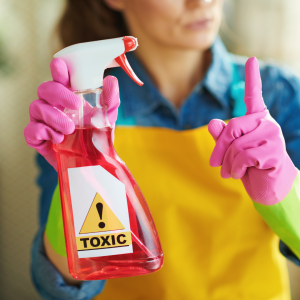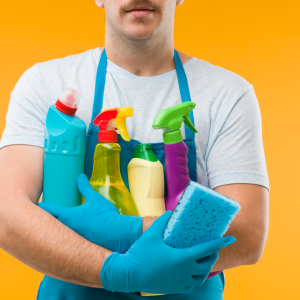Spring Cleaning: Know Difference Between Hacks and Hazards

“Cleaning can make your house safer by decreasing clutter and bacteria on surfaces,” said Gabe Ceperich, director of Environmental Services at Springfield Memorial Hospital. “But many common cleaning products can be dangerous if they aren’t used properly.”
Here’s what to know before rolling up your sleeves for spring cleaning:
- Read the labels. Before you use a household cleaner, check the label for use instructions and warnings. Some popular cleaners are sold in concentrated formulas, meaning that they must be diluted with water before using. Other cleaners must rest on surfaces for a certain amount of time in order to be effective.
- Never mix chemicals. Mixing cleaning products, or using two different products on the same surface, can be very dangerous. For example, mixing products that contain bleach and ammonia can generate dangerous gases that cause lung damage quickly. Mixing vinegar and peroxide creates peracetic acid, which can be harmful to the eyes, skin and lungs. These ingredients are often “hidden” in other products – for example, ammonia in dish soap – so be sure you know what you are using.
- Research before making your own cleaning products. Social media platforms like TikTok are full of “hacks” that purport to make cleaning cheaper, easier and more environmentally friendly. But do some research before following a stranger’s recipe. It could be a waste of money and time – or worse, it could be hazardous. The American Lung Association offers a list of safe, proven cleaning “recipes” that do not generate dangerous fumes.
- Ventilate. Some cleaning products can cause symptoms like eye irritation, coughing, headaches or dizziness if used in an enclosed area. These symptoms are caused by volatile organic compounds (VOCs), and long-term exposure can even cause users to develop asthma and other respiratory diseases. Open windows before, during and after cleaning and use fans to circulate the air.
- Wear gloves. Many cleaning products contain chemicals that can irritate or dry out the skin – especially over hours or days of heavy-duty spring cleaning. Harsh chemicals can even cause burns.
- Always use the mildest cleaning product necessary. This may not even require a trip to the store. A spray bottle of soap and water is an effective way to clean most hard surfaces in the home. And baking soda on a damp sponge makes a good bathroom cleaner. White vinegar mixed with water at six ounces per gallon is effective on restroom mildew if used regularly.
- Consider your family’s needs. If your household includes small children or pets, take particular care to reduce their potential exposure to dangerous chemicals – and make sure cabinets containing cleaning products are securely latched.

The U.S. Environmental Protection Agency maintains a “Safer Choice” list to help consumers pick cleaning products that are both effective and safe.
“The best way to protect yourself from the harmful effects of cleaning chemicals is to be an educated consumer,” said Ceperich. “If you notice symptoms like shortness of breath, coughing or burning in the nose and throat while you clean, leave the area immediately and seek medical help if needed.”
Looking for a healthcare provider? Visit Memorial Care to view providers in our 16-county area who are accepting new patients.